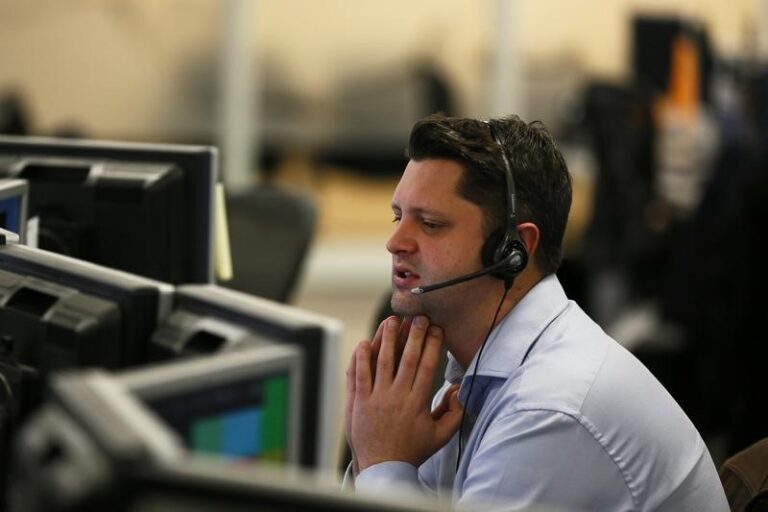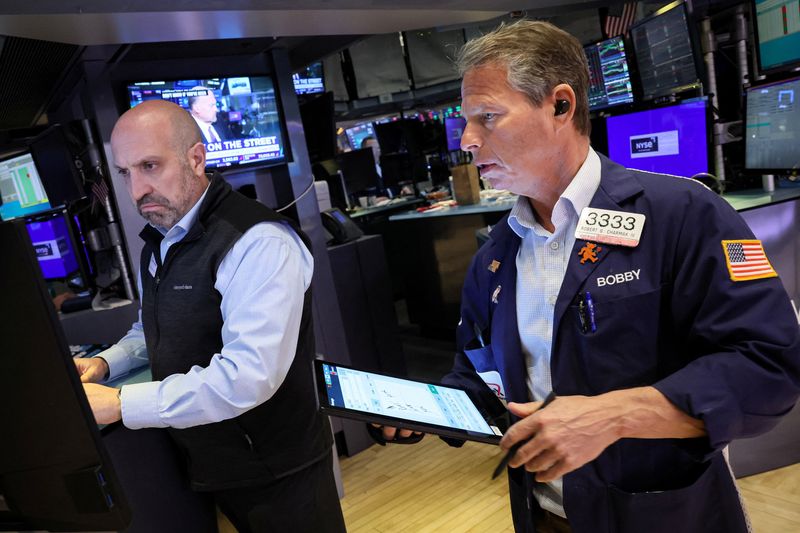
[ad_1]
By Herbert Lash
NEW YORK (Reuters) -Words of caution from Federal Reserve officials on Thursday about the need to keep interest-rate cuts in check until inflation clearly slows snuffed a Wall Street stock rally and sparked a rise in bond prices.
Global equity markets had risen after data showing an increase in new claims for U.S. unemployment benefits kept intact the outlook for the Fed to soon cut rates, ahead of a key jobs report due out on Friday.
But several policymakers soon doused expectations that rate cuts were likely on the horizon as they endorsed a careful approach to the start of monetary easing.
The U.S. central bank has “time for the clouds to clear” on inflation before starting to cut rates, Richmond Fed President Thomas Barkin said.
If inflation continues to stall, no cuts may be required at all by year end, said Minneapolis Fed President Neel Kashkari. And Chicago Fed President Austan Goolsbee called persistent, outsized price increases in housing services the biggest impediment to returning inflation to the Fed’s 2% target.
Since the rally that began in October, the market has enough reasons to feel a little exhausted and vulnerable to sellers, said Rick Meckler, partner at Cherry Lane Investments in New Vernon, New Jersey.
“There were a lot of buyers anticipating the beginning of an interest-rate-decline cycle. At first they were willing to accept that maybe it would come on a delayed basis, but it would come,” he said. “Now there’s just a little bit of doubt as to whether it is going to come this year.”
Early in the session gold prices rallied to an all-time high, with hitting $2,304.09 an ounce, and the benchmark was near a fresh all-time high.
But Wall Street closed sharply lower, with the tumbling 1.35%, the S&P 500 1.23%, and the 1.4%. MSCI’s gauge of global equity performance fell 0.61%.
Stocks rallied after data showed the number of Americans filing new claims for unemployment benefits rose to a two-month high last week, suggesting wage pressures would soften and help slow inflation.
While layoffs increased to a 14-month high in March, job cuts were little changed compared with the same period last year, which pointed to a still-strong labor market.
“We’re seeing that people are getting jobs, and even though you may have had a bit more people who got laid off, we got a lot more of them getting jobs,” said Steven Ricchiuto, U.S. chief economist at Mizuho Securities in New York.
“This number is showing you the tenor of the labor market remains very firm. More importantly, continuing claims is well below the 2 million level” considered normal, he said.
The belief that a rate-cutting cycle will start within the next quarter is really powerful for most investors, said Marvin Loh, senior macro strategist at State Street (NYSE:) in Boston.
Bonds rallied as their yields, which move inversely to prices, fell late in the session. Bond investors were balancing their positions before Friday’s jobs report for March. Nonfarm payrolls likely increased by 200,000 jobs, down from a 275,000 rise in February, a Reuters survey shows.
The two-year Treasury yield, which reflects interest rate expectations, fell 3.4 basis points to 4.645%, while the yield on the benchmark 10-year note fell 4.8 basis points at 4.307%.
The dollar hit a two-week low on the view that the Fed would cut rates by July, if not June, while the battered yen held steady under the key 152 level.
The , a measure of the U.S. currency versus six peers, fell 0.01%, while the risk of Japanese intervention kept the dollar down 0.02% at 151.27 yen.
Oil prices extended gains, settling up more than $1, as geopolitical tensions and output cuts outweighed caution about Fed rate cuts.
futures for June settled up $1.30, or 1.5%, to$90.65 a barrel while U.S. West Texas Intermediate futuresfor May settled up $1.16, or 1.4% to $86.59 a barrel.

Gold prices took a breather after hitting an all-time high earlier in the session.
U.S. settled 0.2% lower at $2,308.50 an ounce..
[ad_2]